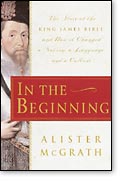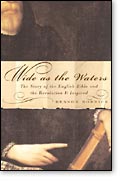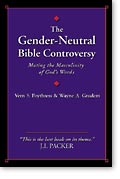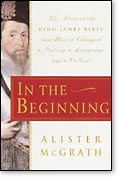
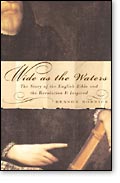
In the Beginning: The Story of the King James Bible and How It Changed a Nation, a Language, and a Culture, by Alister McGrath, Doubleday, 328 pp.; $24.95
Wide as the Waters: The Story of the English Bible and the Revolution It Inspired, by Benson Bobrick, Simon & Schuster, 366 pp.; $26
The Gender-Neutral Bible Controversy: Muting the Masculinity of God’s Words, by Vern S. Poythress and Wayne A. Grudem, Broadman & Holman, 377 pp.; $19.99, paper
The King James Version (KJV) of the Bible is now only one among many Scripture translations widely available to readers of English. Although sales of the KJV in the United States are topped only by sales of the New International Version (NIV), the status of the KJV as the overwhelmingly dominant translation has been fading for at least a century, heralding the end of a well-defined historical epoch that lasted from about the mid-seventeenth to the mid-twentieth century.
It was an era decisively marked by the assumption, often unspoken, that the Bible in English was simply the version first published in 1611 by order of King James I. This assumption meant that when readers or hearers of Scripture came to the end of the 23rd Psalm, they expected to find, “Surely goodness and mercy shall follow me all the days of my life: and I will dwell in the house of the Lord for ever.” It was immaterial that at least one alternative rendering had remained more popular in England and America for at least a generation after 1611 (the Geneva Bible’s “Doubtless kindness and mercy shall follow me all the days of my life, and I shall remain a long season in the house of the Lord”). Nor did it register that several translations produced at about the same time were favored by significant groups of English speakers. Regardless, most English readers would have heard something amiss in any alternative, like the Douai-Rheims version of 1582 (“And thy mercy will follow me all the days of my life. And that I may dwell in the house of the Lord unto length of days”).
The three books noticed in this review testify in different ways to how significant it was in British and American life for the KJV to prevail so widely and so long. Alister McGrath’s In the Beginning and Benson Bobrick’s Wide as the Waters join a long line of volumes treating the circumstances leading to the KJV, the nature of the translation itself, and the effects of this version on the English language and Anglo-American culture. If neither volume is likely to replace F. F. Bruce’s indispensable History of the Bible in English (3d edition, Oxford University Press, 1978), both are still attractive volumes. Together they explain why, in the well-considered assertions of Debora Shuger, “The Bible remained the central cultural text in England” as “it continued to generate knowledge and narrative” and as it “operated as … the site where the disciplines converge.”
There is some overlap between the books by McGrath and Bobrick, but it is an edifying redundancy. Both are especially good on the importance of pre-KJV translations, particularly William Tyndale’s first complete New Testament of 1526. They also show how much the KJV translators were influenced by the Geneva Bible (first published by English exiles in 1560), an extremely popular version eventually undone by its extensive, violently anti-monarchical notes. (The desire to get those notes out of circulation was one of the main reasons that James I agreed in 1604 to commission a new translation.)
Both books also comment on an unfortunate precedent set by the Geneva Bible, which was the first English-language version published with verse divisions. Segmenting the text like this—a practice that has thankfully been overcome in many recent translations—may have been a boon for checking references, but it was otherwise a disaster; it encouraged prooftexting, obscured the integrity of narratives, and dismembered cohesive discourses under the control of the inspired authors into fragments manipulated by uninspired readers. Among many other riches, the two studies also reveal the roots of Sunday morning confusion over public recitation of the Lord’s Prayer arising from differing results from Tyndale (“forgive us our trespasses”) and his successor Miles Coverdale (“forgive us our debts”) in rendering Matthew 6:12.
McGrath, as befits his expertise as a theologian, provides expert commentary on the technical and mechanical aspects of the translators’ task. His detailed description of the physical labor required to print such a big book in the pre-digital age is especially illuminating. But his assessment of Greek texts underlying the translation, principles employed by the translators, and results on specific passages are equally solid.
As befits his experience as an author of accessible popular histories, Bobrick excels on the human dimensions of translation work. His accounts of John Wycliffe, Tyndale, Coverdale, Thomas Cromwell and Thomas Cranmer (the crown officials who began the process of preparing “authorized” versions), and the KJV translators themselves are exceptionally able. They reveal especially the extraordinary depth of commitment that drove translators in their efforts to clarify what the Bible said.
At the end of his own lucid discussion of the translators and translations of the sixteenth century, C. S. Lewis paused to note that, if we but had our wits about us, we would realize that “all translations of scripture are tendentious: translation, by its very nature, is a continuous implicit commentary.” So long as the KJV enjoyed supremacy, it was easy to forget that truth. The passing of the KJV thus bears directly on the energetic, sometimes angry, debates over Bible translating that have washed over the English-speaking world during the last 50 years. Heated reaction to the appearance of the Revised Standard Version in 1952 drew attention to the inherently tendentious character of translation itself, though readers of McGrath and Bobrick will smile at knowing that criticism of equal severity greeted the KJV in 1611.
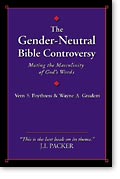
Of recent translation traumas the freshest for most evangelcals is the fury over the proposal by Zondervan Publishers and the International Bible Society to bring out an American printing of the NIV Inclusive Language Edition that had been published in Great Britain in 1996. This proposal immediately generated a spate of charge, rebuttal, and counter-charge: Was the NIV caving in to militant feminism? Was the NIV committee merely responding to altered language usage? And so on. A short review cannot address the course of the debate or expound on the issues involved, but it can recommend the volume by Vern Poythress and Wayne Grudem as a beneficial product of the fray. The Gender-Neutral Bible Controversy is an opinionated book, since Poythress and Grudem were leaders opposing the new translation. But whether or not readers agree with where the authors come out, they should benefit from following their arguments.
The great benefit of this book is to disentangle the many complicated issues involved in producing an English-language Bible for the ideologically charged climate of our day. So, for example, readers will find careful discussions on translating most of the words that in past versions appeared as men, man, or brother (including anthropos and aner). There is also extensive consideration of “generic he” (as a singular pronoun referring to any one person).[1]
It is extremely unlikely that the dominant cultural place held for so long by the KJV will ever be filled by another version. If, however, translators and publishers of the multiplying versions that now pour from the presses are able to act with the same seriousness that drove the KJV translators and their predecessors, the spiritual power that attended the KJV will enjoy undiminished vitality. The compelling message of books about translations of the Book is that Bible translations matter precisely, but only, because the Bible matters.
Mark Noll is McManis Professor of Christian Thought at Wheaton College. He is the author most recently of Protestants in America (Oxford University Press) and American Evangelical Christianity: An Introduction (Blackwell).
1. For a full consideration of relevant issues, the truly engaged should read able books written from other points on the partisan compass, such as D. A. Carson’s The Inclusive-Language Debate: A Plea for Realism (Baker, 1998).
NOTE: For your convenience, the following products, which were mentioned above, are available for purchase: • In the Beginning, by Alister McGrath • Wide as the Waters, by Benson Bobrick • The Gender-Neutral Bible Controversy, by Vern S. Poythress and Wayne A. Grudem
Copyright © 2001 by the author or Christianity Today/Books & Culture Magazine.Click here for reprint information on Books & Culture.


